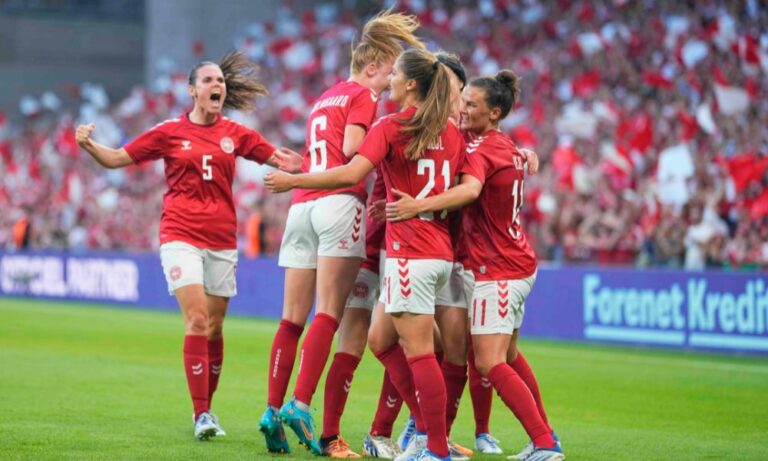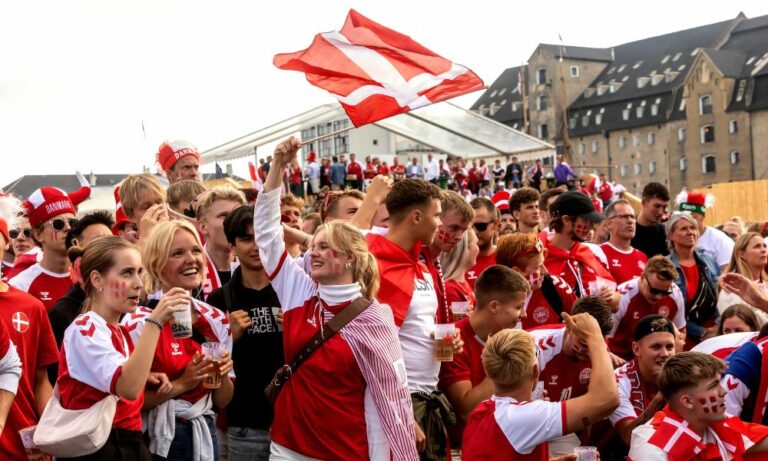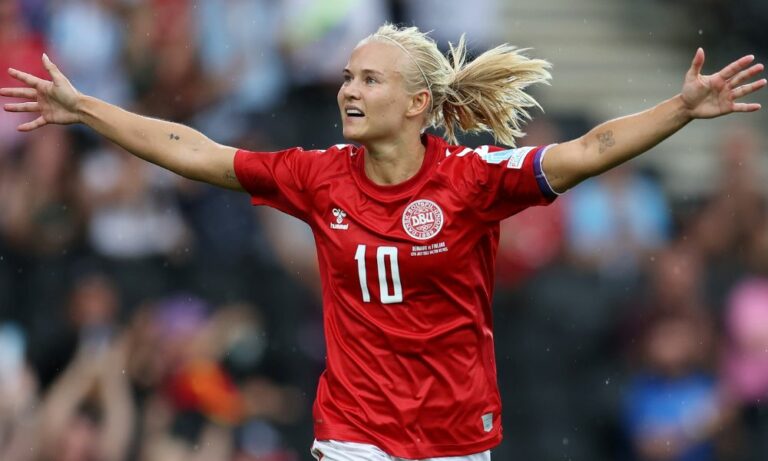24th June was a watershed moment for women’s soccer in Denmark.
Headlined by captain and all-time leading goalscorer Pernille Harder, a star-studded Danish lineup received a raucous reception at Copenhagen’s Parken Stadium. Some 21,542 adoring fans – a record attendance for a Denmark women’s national team game – were there to watch Harder, one of the biggest names in the sport, alongside the likes of Real Madrid’s Sofie Svava and Nadia Nadim, who was closing in on her 100th international appearance.
Denmark’s 2-1 victory over Brazil, courtesy of a 91st-minute winner by Mille Gejl, topped off the team’s historic first outing at Parken, an occasion that showcased the growing popularity of women’s soccer in Denmark.
Now, the Danish Football Association (DBU) and city of Copenhagen have bolder ambitions in mind. Together with its Nordic neighbours in Sweden, Norway and Finland, October saw Denmark enter the bidding race for the 2025 Uefa Women’s European Championship. The goal? To deliver the biggest edition of the tournament to date.

“We – in the Nordics – want to take the Uefa Women’s Euro to the next level,” Jakob Jensen, DBU chief executive, tells SportsPro. “We will grow the fan culture of women’s football and organise the biggest Uefa Women’s Euro ever.”
In October, European soccer’s governing body Uefa confirmed it had received four bids for its flagship women’s national team tournament, with rival dossiers submitted by France, Poland and Switzerland.
In launching their bid, the Nordic federations said they intend to make 800,000 tickets available for the tournament, with the final being staged at Stockholm’s 50,000-seater Friends Arena. The proposal would see games spread across the four capital cities of Copenhagen, Stockholm, Oslo and Helsinki, with fixtures also taking place in Odense, Gothenburg, Trondheim and Tampere.
“For women’s football in Denmark it would be a great inspiration for the younger generation to have their idols playing at home,” Jensen adds. “Hopefully it will grow the women’s game here in Denmark and inspire more boys and girls to play football.”
Channelling the Nordic spirit
The four Scandinavian countries involved in the bid share much more than just geographical proximity. United by a shared commitment to sustainability, inclusivity and gender equity, hosting the Women’s Euro would see the four nations champion these values.
Adamant that the tournament would showcase “the best of Denmark and Copenhagen”, Jensen believes that the Nordic countries would set the standard for what the event can achieve in terms of social impact.
“We will ensure the continued development of women’s football for equal opportunities, more diversity and better sustainability across our common Nordic visions and values – and we will welcome people from all backgrounds to a celebration of football,” he says.
That vision is shared by Mia Nyegaard, mayor of culture and leisure at the Copenhagen City Council, who reiterates the countries’ joint mission to set a new benchmark for sustainable development at the Women’s Euro.
“We need to set ambitious goals,” she declares. “By integrating the United Nations Sustainable Development Goals in our event planning and work with different aspects of sustainability – cultural, social and climate objectives – the aim with [Women’s Euro 2025] is to have the most sustainable championship to date.
“Hence, we will encourage visitors to use green mobility such as bicycles, reduce the carbon emissions, and drive social inclusion through football.”
All four of the capital cities have pledged to reach net zero carbon emissions in the coming years. Having cut its own CO2 emissions by 80 per cent since 2009, Copenhagen’s reputation as a hub of sustainability has attracted major sporting events to its shores in recent years.
Indeed, Denmark’s capital played host to four matches during the men’s 2020 Uefa European Championship, as well as last year’s Tour de France Grand Départ. Also in 2022, SailGP’s inaugural Copenhagen event, powered entirely by clean energy, was the sailing series’ most sustainable yet.

“Hosting Euro 2020 and other large international events has showcased Copenhagen as an open, inclusive green and sustainable capital with the necessary experience and cross disciplinary host city skills to take on the task of hosting [Women’s Euro 2025],” Nyegaard says.
“The City of Copenhagen [Council] is also experienced when it comes to building host city programmes for side events engaging both visitors and citizens. We want to promote Copenhagen as an attractive and liveable city.”
Jensen is also confident that Denmark would emulate the fan experience of Euro 2020 if the tournament’s women’s equivalent arrives in 2025.
“Together with Copenhagen we created a brilliant atmosphere around Euro 2020,” he states. “We had unforgettable matches in Parken and very good experiences with the Football Village at Ofelia Beach in Copenhagen, where many fans came to celebrate the game of football.”
Champions of inclusivity
In Copenhagen’s case, the motivation to stage major sporting events stems from more than just an appetite for commercial gain, but rather a commitment to inspire broader societal change and to forge a legacy through sport.
“For Copenhagen, events are about more than prestige,” says Kit Lykketoft, director of convention at Wonderful Copenhagen.
“They work as a catalyst for pushing an agenda leaving positive legacies. With Copenhagen Legacy Lab we put this effort into a system and work strategically to make a difference, just as we measure the impact.
“The Women’s Euro will be part of a broader agenda on promoting women in sports and equality in sports.”
A strategic initiative launched by the Copenhagen Convention Bureau, the Copenhagen Legacy Lab is described as ‘a nexus’ seeking to deeper integrate international events with the local public, business and science communities by exploring and developing activities that can deliver impact in the long term.
Euro 2020 was one event that fed into the programme.
“It was important for the City of Copenhagen to take the opportunity of using Euro 2020 to promote football as a diverse and inclusive sport by engaging both various and new target groups in the many local side events through the ‘Outreach & Legacy Programme’, which boosted different agendas and projects beyond the realm of football, [such as] social inclusion, sustainability and new urban football facilities,” Nyegaard explains.
Describing inclusion as “essential” both in Copenhagen and Denmark more broadly, Nyegaard believes that staging Women’s Euro 2025 would build on the foundations laid by hosting games during Euro 2020.
“A strong legacy from Copenhagen hosting Euro 2020 is an ongoing project strengthening the local football clubs, making them more capable at attracting and retaining girls in the clubs, and educating more female trainers and referees,” she continues.
“We want to further strengthen these cooperations and objectives and bring more themes into play. This could be by bringing more urban spaces to play football in the city into play, collaborations with schools and kindergartens, mental wellbeing in sports, [and] mix football formats.”

Developing the game
As the Nordic nations and other bidders anxiously await Uefa’s decision on the hosting of the next Women’s Euro, the triumph of last year’s championships in England will be fresh in their minds.
Last July, when England’s Lionesses became European champions by defeating Germany at Wembley Stadium in front of a record crowd of 87,192, it was the crowning moment for a tournament that set milestones both on and off the pitch.
With records being shattered, barriers broken and history rewritten, women’s soccer is seeing exponential growth in the UK on the back of staging the Women’s Euro, which delivered a UK£81 million (US$97.3 million) economic boost to the English host cities.
Looking ahead, Lykketoft is hopeful that Women’s Euro 2025 can have a similar impact in the Danish capital.
“It is so important that the younger generation as well as the rest of us have role models, be it Christian Eriksen or Pernille Harder, who prove the dream to become a professional athlete is for everyone,” she says.
“This world needs much more diversity in its role models, both on and off the pitch, and we think a Euro 2025 in Scandinavia will support just this.”

